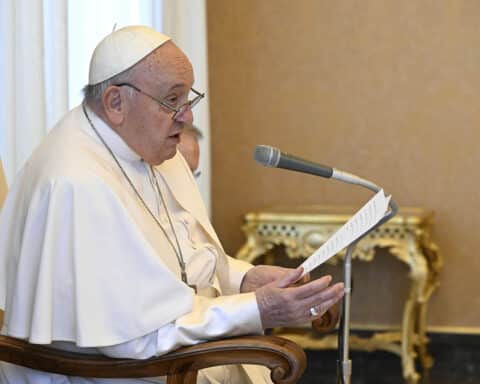The Catholic Church contains a vast treasury of prayers and devotions that a person could commit to, practices passed down from time immemorial and brand new approaches rooted in two millennia of tradition. There’s the Rosary, of course, and the Divine Mercy Chaplet. There’s the Jesus Prayer and novenas to all sorts of saints, the Liturgy of the Hours and daily Mass, lectio divina and Ignatian meditation. Some people light candles or oil lamps on a home altar, while others are intentional about seeking the voice of God in nature each day. We write icons or walk labyrinths or fast or feast or journal or meditate on the Stations of the Cross or cling to our chotki. When you begin to dig below the surface level of Catholic devotions, it’s utterly overwhelming how many ways there are to talk to God.
Where, then, is a good Catholic to begin?
Which of the thousand Catholic approaches to prayer do you commit to? Do you feel guilty about every one you don’t embrace or only about a few core options? Certainly it’s easier to content ourselves with the bare minimum required of us — going to Mass each Sunday and Holy Day of Obligation and possibly saying grace before meals — rather than open the floodgates by beginning to explore different devotions.
Mercifully, this treasury is a feast we’re all invited to, a buffet from which we can sample all sorts of practices before settling on the ones that draw us most deeply into the heart of Jesus. Better still, it’s a feast that we’re invited to again and again, asked to visit anew at Advent and Lent, at the new year and the beginning of the school year, after a good confession or retreat, or upon the sudden realization that we’ve lost the love we had at first. Each time, the Church invites us to try something new, to commit — even if just for a season — to a new practice that might make space for God in our lives.
This year, as we approach the Sunday of the Word of God on Jan. 22, why not make a belated New Year’s resolution to engage with Scripture in a more intentional way this year?
The Bible is at the very heart of the Church’s doctrine and practice, molding the words of the liturgy, shaping the mysteries and prayers of the Rosary, recited day in and day out in the Liturgy of the Hours. It’s the place where God reveals himself to us, where we come to know him as he is and to know ourselves in the light of his love. Indeed, the Bible holds pride of place in the devotional life of the Church; the Second Vatican Council said, “The Church has always venerated the divine Scriptures just as she venerates the body of the Lord” (Dei Verbum, No. 21).
But has this been our experience of Scripture as Catholics? Have we sought it out as we seek out the Eucharist? Have we hungered for it, longed for it as we did for the Sacraments when pandemic restrictions kept us out of our churches?
For many of us, the answer is a resounding no. We hear the Bible read to us at Mass, but that’s often the extent of our relationship with the text of which St. Jerome said, “Ignorance of the Scriptures is ignorance of Christ.”
There’s no need for self-recrimination here — Jerome’s statement should be read less as a condemnation than an invitation. You who love Jesus could love him so much the more if you met him in his word. You who don’t know him yet might meet him there, in his words of compassion for the broken or judgment of their oppressors.
In Genesis, you’ll see Isaac, the beloved son, carrying the wood for his sacrifice up the mountain, and you’ll know more fully just what Calvary meant. In the Psalms, you’ll join your prayers to those who rejoice and those who despair, to those who plead and those who rage. You’ll see how the Lord hears and honors even those cries of which we’re ashamed. In Isaiah you’ll read of the anguish of an unredeemed world and the hope offered by the Promised One, by the Messiah we receive each Sunday in the Blessed Sacrament. In Paul’s epistles you’ll be called to conversion again and again. In Acts, you’ll marvel at the early Church’s responsiveness to the Spirit and wonder how you might live with the same docility.
And in the Gospels? Oh, in the Gospels you’ll see Jesus the bridegroom, the savior, the Lord and lover of souls. You’ll hear him speak in the words you’ve heard a dozen times but never listened to before. You’ll wonder at his mercy and startle at his warnings and while you may be baffled by any number of things, even in the confusion you’ll find you know him better and love him more.
All that’s well and good, you might say, but where to start?
There are any number of different ways to approach reading Scripture; you might try lectio divina, pull out commentaries for some deep study, compare translations, attempt Ignatian meditation, memorize a short passage, or create artwork based on a particular verse. And then there’s the question of which Scriptures to read. Many people pray with the Mass readings for each day, while others take a book at a time and divide it into manageable chunks. Tens of thousands of people have joined Father Mike Schmitz, listening to him read and comment on the whole Bible in a year, while others have found it more beneficial to read the text themselves.
For me, the most fruitful practice has involved a daily schedule of reading that takes me through the whole Bible each year — I’ve just finished my 21st time through, and it remains fresh and new, even after all these years. I’ve found this schedule so helpful that I’ve even written a journal to help people read the whole Bible in a year, with reflections each day to help make sense of the Scriptures.
Regardless of the approach you take, whether systematic or scattershot, the word of God remains “living and effective, sharper than any two-edged sword, penetrating even between soul and spirit, joints and marrow, and able to discern reflections and thoughts of the heart” (Heb 4:12). When you spend time reading Scripture, you may not always feel thrilled by what you find there. You may not even be able to make sense of it. But when you make space for God to speak to you through his word, he begins to move, even if slowly and silently. And if you commit to daily time with Scripture this year, you’ll find that come 2024, you’ll know him better and love him more.
Meg Hunter-Kilmer is the author of “A Year in the Word Catholic Bible Journal” (OSV, $29.95).
| ‘A Year in the Word’ |
|---|
|
The Bible is an intimidating book, and while many Catholics want to read it, they aren’t sure where to begin. Many have started reading Genesis with the intention of reading the whole Bible, only to give up by Numbers. Accessible, inspiring, and written from a layperson’s perspective, “A Year in the Word Catholic Bible Journal” (OSV, $29.95) is the guide you’ve been searching for to help you read the full Bible. Meg Hunter-Kilmer has read the entire Bible over 20 times, and she has lots of tips, insights, and encouragement to help you make it from cover to cover, praying and journaling as you go. With an attractive one-page-per-day format, you can challenge yourself to read through the whole Bible in a year or simply take it one day at a time until you’re finished. By the end, you’ll have a journal full of your writings to reflect on, in addition to the relatable reflections already included in the book, allowing you to immerse yourself more fully in the Word of God. Purchase at osvcatholicbookstore.com. |





